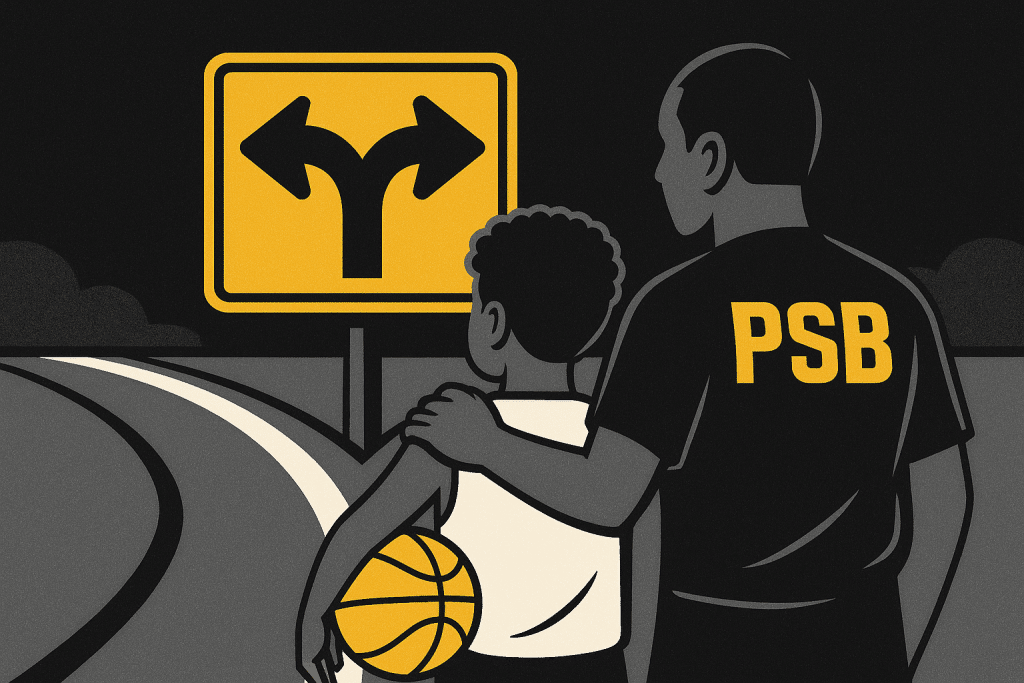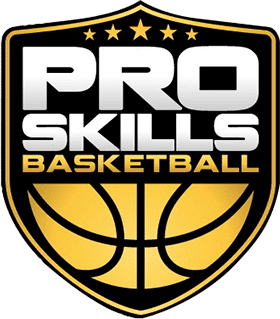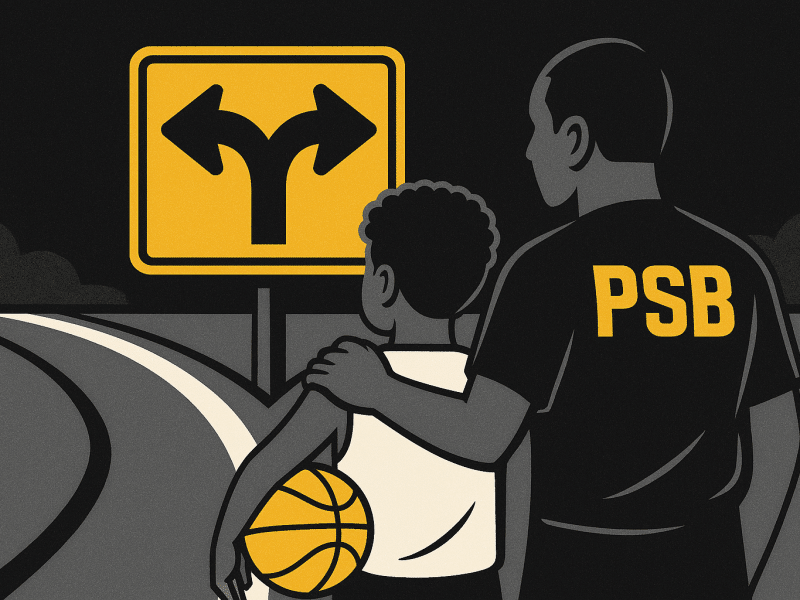
There’s a moment every parent of a young athlete inevitably hits—a moment that feels like a crossroads.
On one side: your deep, unwavering love and care for your child.
On the other: the reality that you can’t control their experience.
You can’t control if they start or if they win.
You can’t control how many minutes they get.
You can’t control how a coach sees them.
You can’t control their confidence from game to game.
This tension—caring deeply but feeling powerless—is one of the most emotionally challenging parts of parenting in competitive sports. And yet, it’s also one of the most powerful opportunities we have to grow alongside our kids.
What Happens at the Crossroads
When these two forces collide—care and powerlessness—many of us default to self preservation behaviors.
We feel frustrated.
We get overly emotional.
We overstep boundaries—sometimes with coaches, Directors, other parents, our spouses, and sometimes with our own child.
We grasp for control, hoping to “help,” but unintentionally we add pressure.
Why? Because we care. That’s the starting point.
But when care goes unchecked by reflection, it can turn into control, reactivity, and irrational thinking.
This is the crossroads.
And what we do here matters—for our kids and for our relationship with them.
The Power of Coalescing Two Opposing Truths
As parents, we’re called to do something incredibly hard—and incredibly powerful.
To hold two truths at the same time:
- “I care deeply.”
- “I can’t control this.”
When we learn to coalesce these two truths, we become what our kids need most—not the rescuer, not the fixer—but their foundation.
A steady presence in moments of struggle.
A source of calm when emotions rise.
A safe place where they can land, process, and grow.
That’s not weakness. That’s strength.
That’s not letting go. That’s leveling up as a parent.
Our Story – The Offense/Defense of Parenting
My wife and I live this every day.
As basketball and soccer parents, we’ve ridden the rollercoaster of great games, tough losses, unfair calls, tough coaching, disappointing decisions, and emotional car rides home.
What we’ve learned—and are still learning—is that our son and daughter need different things at different times.
Sometimes, they need space:
- To sit with their emotions.
- To work through disappointment.
- To process without our input.
Other times, they need help:
- A hug.
- An open ear.
- A moment to vent.
- A bit of quiet solidarity.
And honestly? It’s hard to tell which is which in real time. We’ve messed this up plenty.
But we’ve also gotten better.
And here’s what helped it click: it’s no different than what we teach our players on offense.
Sometimes the ball needs help.
Sometimes the ball needs space.
The skill? Learning to discern which moment you’re in.
As parents, we need that same feel.
When to step in.
When to step back.
When to say something.
When to just be.
This journey has helped us understand our kids more deeply:
- How they process.
- What kinds of questions they respond to.
- When to push.
- When to sit in silence.
And as a result, they’ve learned to communicate more too:
- “I’m upset, but I just need time.”
- “Can I talk to you about that subbing decision?”
- “I don’t need advice—I just want to feel heard.”
They’ve learned not to fear emotions, but to name them.
We’ve learned not to fear discomfort, but to trust the process.
Discomfort Isn’t Danger — Learning the Difference
One of the biggest parenting breakthroughs we’ve had is this:
Discomfort and danger are not the same thing.
But in youth sports, they feel the same.
Your child is crying because of a bad loss, poor experience, or a number of other things
They got benched.
They’re frustrated with their role, their teammates, how they’re playing.
They’re not having fun.
And everything in your body screams, “Fix it.”
But here’s the truth: discomfort is not always something to be solved—it’s something to be felt, understood, and grown through.
When we react to every uncomfortable moment as if it’s a threat, we rob our kids of the exact adversity that builds resilience, self-awareness, and grit. The exact adversity that likely helped us as parents grow into who we are today.
Danger says: “My child is unsafe. I need to intervene.”
Discomfort says: “My child is struggling. I need to support, not solve.”
At PSB, we want our players to be challenged. To feel stretched. To wrestle with growth.
That means they’ll be uncomfortable at times—and that’s okay.
The key is being the parent who can tell the difference.
Are we stepping in because it’s truly danger?
Or are we stepping in because discomfort is hard to watch?
One deserves action.
The other deserves presence.
What It Means at PSB
At Pro Skills Basketball, we aren’t just trying to build better players. We’re trying to build better people—kids who know how to handle adversity, work through tough moments, and grow from them.
That means the learning can’t just happen on the court. It happens in:
- Car rides home.
- Quiet conversations.
- Missed shots.
- Unfair calls.
- Emotions that don’t always have tidy solutions.
When we as parents understand the crossroads—when we let our care coexist with our lack of control—we support the process. Not just the outcome.
We give our kids something far greater than advice or correction—we give them resilience.
Final Thought – The Pause That Changes Everything
So next time your child walks off the court upset, or you feel the tension rising in your chest, try this:
Pause.
And ask:
“Am I reacting from fear… or responding from care?”
That one pause—that one moment of presence—can change everything.
It helps you show up from love, not ego.
From wisdom, not impulse.
From trust, not control.
And your child?
They’ll feel it.
They’ll remember it.
And they’ll grow because of it.
Let’s be the kind of parents who hold the tension well.
Who coalesce care and powerlessness into something powerful.
Who show up—not perfectly—but presently and consistently.
And let’s walk this journey with our kids, not in front of them trying to shield them… but beside them, helping them become strong enough to walk it themselves.
Leave it all on the Court
Chris Goodrum
COO, Pro Skills Basketball



